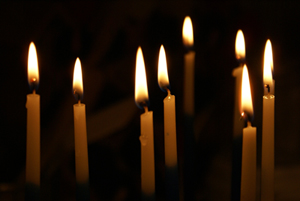Hanukkah an all-time favorite Jewish holiday, has interesting historical value dealing with issues relevant to Israeli culture and sense of identity. Hanukkah commemorates the victory of the ancient Israelites over the Greeks in a series of battles taking place around the year 165 BC. The battles were not about territory nor resources, but dealt with freedom; the right to practice religion and follow the Jewish faith.
While Hanukkah, traditionally speaking, is only a minor Jewish holiday, it has taken a place equal to Passover as a symbol of Jewish identity. Both the Israeli and North American versions of Hanukkah emphasize resistance, focusing on some combination of national liberation and religious freedom as the defining meaning of the holiday. “Classical rabbis usually downplay the military and nationalistic dimensions of Hanukkah, yet some even interpret the story of the miracle oil as a creative diversion away from the struggle with empires that had led to the disastrous downfall of Jerusalem to the Romans.” (source [1])

image above: a lit menorah, symbolizing the miracle oil which provided light for eight consecutive days in the Jewish Temple
Hanukkah is celebrated in many homes spanning both secular and religious sectors of Israeli population. A recent survey [2] shows that the majority of Israelis (83%) light a candle every single day of Hanukkah, an amazing figure considering the explicit religious-secular tear within the society. Israel is a country where many secular citizens feel the burden of religious law forced upon their everyday lives, since they identify [3] as Israeli first, and Jewish second. (a great post on Jewish-Israeli identity [4])
A substantial difference between orthodox and secular Israeli perception of the holiday is evident from the Hebrew blogosphere. While the secular emphasizes the importance of family [5], tradition and delicious food [6] that Hanukkah brings to their dinner tables, their counterparts focus on modern day Israel's loss of culture [7]; its loss in the culture-war with the West. They highlight the irony of celebrating Hanukkah, which comes to commemorate the same war that the ancient Israelites fought against the Greeks thousands of years ago in order to preserve their culture.
In his blog entry [8], Rabbi Yehuda (Hebrew) depicts his thoughts on how current-day Israel has lost in its modern culture battle against Western culture:
The Greeks did not want to kill the Jews. They did not want to kill the people whom they conquered. They only wanted two things: money from the conquered people, and that people accept and perform according to Greek culture – horse racing, wrestling, play their music.
The Greeks believed that the Jews will come to their games, and eventually be lured to participate in their culture; that they will turn Greek and leave Judaism without being forced to.
Regretfully, the Greeks were correct. Most Israelis have converted to their culture, act according to their culture. Because it is obviously nicer to go to see shows in comparison to studying the Torah. And because of this pleasure-seeking behavior, they give up the holy Torah. The Hashmonean people (http://en.wikipedia.org/wiki/Hasmonean) fought over the right of the Israelites to follow god. They realized the importance of not only seeking immediate fun, but to take part in more important actions (…study the Torah).
For further background on the story of Hanukkah visit this post [9].